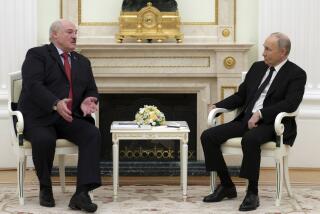Chechen Rebels, Russian Troops Mass at Border
- Share via
MOSCOW — In a tense standoff, Russian and Chechen forces confronted one another along their mutual border Sunday, as Russian Prime Minister Vladimir V. Putin told a national television audience that the Kremlin’s 1996 peace deal with Chechnya was a mistake.
In heated language reminiscent of the kind used by Russian officials at the height of the 1994-96 Russian war with the separatist republic, Putin said that Chechnya is a criminal state and that Russia must crush its bandit gangs decisively.
Russian warplanes have been pounding Chechnya in recent days, and 30,000 Russian troops moved into positions along the border Sunday. Up to 2,000 Chechen fighters were massed on the other side.
In the aftermath of a series of terrorist bombings of apartment buildings in Moscow and southern Russia, which authorities have blamed on Chechen rebel leaders, the public mood for revenge against the Chechens is high. More than 300 people were killed in the bomb attacks. The most recent, in the city of Volgodonsk on Thursday, killed 17.
Putin made no mention of a ground attack by Russian forces against Chechnya but said that intensive air attacks would continue. It was not clear whether the Russian forces closing in on Chechnya would blockade its border or whether a ground attack was being contemplated, as some Russian media have speculated.
In a lengthy interview on the RTR television network Sunday, Putin said that Russia must either subdue bandits in Chechnya or face new terrorist attacks. He said Chechnya has carried out genocide, pogroms and rapes against Russian people.
“These people must be destroyed. There simply is no other response,” Putin said.
While that rhetoric is strikingly similar to what Russian officials used during the war, there is an important difference: This time, there appears to be no opposition to fighting. Grigory A. Yavlinsky, leader of the moderate Yabloko party, was a main opponent of the Chechen war because of the high civilian casualties. But Sunday, he backed the current military campaign.
“We should be prepared for a long and difficult resistance to militarized criminals,” Yavlinsky said, reflecting the growing nationalist mood in Russia.
Fueling the strong anti-Chechen sentiment, Russian television has been airing brutal footage in recent weeks of such incidents as kidnappers in Chechnya maiming and executing victims.
Chechen officials claim that Russian airstrikes have killed more than 200 civilians and driven 30,000 people from their villages. The Russian side denies any civilian casualties and claimed Sunday that 140 rebels were killed in 50 bombing raids Saturday.
Authorities accuse two Chechen rebel leaders, Shamil Basayev and a Jordanian- or Saudi-born fighter known as Khattab, of ordering the wave of terrorist bombings in Moscow and southern Russia. The two are leading a guerrilla campaign to split the neighboring republic of Dagestan from Russia.
Putin said the two are being backed by international Islamic groups that aim to form an independent Islamic state in southern Russia, stretching from the Caspian Sea to the Black Sea.
The tough rhetoric from Putin, President Boris N. Yeltsin’s chosen successor, comes as he faces enormous political pressure, with the main suspects in the terrorist bombings still on the loose. Adding to his troubles, Putin promised in August that it would take just two weeks to defeat Basayev’s militants in Dagestan, but fighting there has continued.
After Chechnya declared itself independent in 1991, Russia waited until December 1994 to attack in an effort to quell that move. The war lasted almost two years and cost an estimated 80,000 lives, including those of tens of thousands of civilians. In early August 1996, Chechen rebels launched an audacious attack on the capital, Grozny, fighting the Russians to a standstill.
It was an ignominious defeat, and Basayev played a key role in the Chechen victory.
The peace deal forged later that month provided for the withdrawal of Russian forces from Chechnya and for joint Russian-Chechen patrols, but it left the question of Chechen independence to be resolved after five years.
Now, Putin says Russia made a mistake in signing the pact.
“This is not a proper legal agreement because it was signed outside the framework of Russia’s legal authority,” he said Sunday.
In Putin’s telling, Chechnya created a criminal economy after the war, setting up narcotics factories and kidnapping people for ransom. The prime minister said Russia did nothing to stop that because of the Russian “syndrome of defeat after the war.”
But Putin insisted Sunday that the nation cannot afford to give up Chechen territory.
“If we leave [Chechnya], the aggression will continue. I’m completely convinced that if we allow this to happen, the tragedies that occurred in Moscow and in the Rostov region [in southern Russia] . . . will seem like child’s play to us,” he said, referring to the recent bombings and the fighting in Dagestan.
More to Read
Sign up for Essential California
The most important California stories and recommendations in your inbox every morning.
You may occasionally receive promotional content from the Los Angeles Times.













